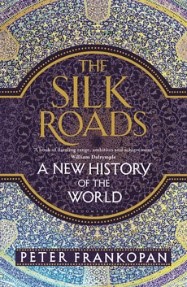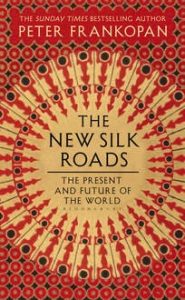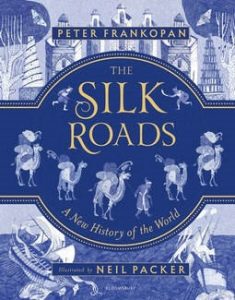UPDATE
Schools History Project Essay Competition
in association with Professor Peter Frankopan, No More Marking and Hodder Education

UPDATE
*** In response to questions that have been asked about the scope of the question, the deadline, prizes, sixth-form eligibility, independent schools and home-schooled students, this post has been updated ***
These are strange times indeed.
As we are all finding news ways of working, why not use this as an opportunity to broaden your curriculum, develop students’ research skills, practise their extended writing and give them some choice about what it is they are studying? The whole world is facing a new problem. So, why not give your students an opportunity to find out more about the wider world?
Why not invite your students to take part in the Schools History Project’s nation-wide essay competition in collaboration with a world-leading historian and an exciting education research company?
What is it?
It is an essay competition open with two categories – one for primary-school-age pupils and one for secondary-school-age pupils.
The task is straightforward, they must use the resources at their disposal to answer the following question, set by the world-leading Oxford history Professor Peter Frankopan (@peterfrankopan) and author of The Silk Roads – A New History of the World:
“If 1066 is said to be the most important date in English history, what is the equivalent in another country?”
Simple? Yes and no – we want to widen the scope of students’ historical studies and so you should bear in mind that essays that do not deal with Western Europe and North America post-1492 and will be more generously marked by assessors.
Also, extra credit will be given for geographical and chronological ambition.
How will you decide on the winner?
The essays, once complete, should be submitted to students’ usual history teachers. Teachers will have an opportunity to look at students’ work and offer some feedback (please see ‘Can I help my students?’ below) this should allow teachers to use these essays to meet schools’ requirements for assessment etc. Teachers will then select the best essay from each school to submit to the national competition. A panel put together by the Schools History Project will use No More Markings’ (@nmmarking) very clever comparative judgement software to whittle these submissions down to a Long List. (If teachers wish to be involved at this stage to find out more about comparative judgement or to see how their students’ efforts stack up against the best of the rest, they should please email SHP@leedstrinity.ac.uk.)
The Long List will, in turn, be passed on to Professor Frankopan and his panel of expert historians. From the Long List, a Short List will be chosen for both the primary and secondary age-groups. These essays will then be recorded by professional actors and presenters and shared online – we are in negotiation with some exciting people.
The eventual winner will be chosen by public vote on social media.
| Who does what? | ||
| Students | Students write essays. | |
| Teachers | Students’ usual history teacher will decide which is the best essay from their school and email it in. | |
| Long List Panel | The Long List panel will use No More Marking’s comparative judgement software to create a Long List for primary-age students and one for secondary-age students. (If teachers wish to find out more about No More Marking’s comparative judgement process, they are welcome to be involved at this stage.) | |
| Short List Panel | Professor Peter Frankopan and his team will decide on a primary-age and secondary-age Short List. | |
| Presentation of the Short List | The shortlisted essays will be recorded by professional actors and presenters. | |
| Public Vote | The winner of each category will be decided by public vote on social media. | |
Who is this competition for?
All primary, secondary and 6th form / FE students – there will, in effect, be three competitions; one for primary school-aged students, one for secondary school-aged students and one for 6th form / FE students
How do I get started?
Simply tell your students what the task is. However, it would be helpful if you could just drop a quick email to SHP@leedstrinity.ac.uk with your school name just so we have some idea of how many people are taking part.
Am I allowed to help my students?
Yes – to an extent. The rules are similar to the old rules for coursework: teachers can review (but not mark) a draft and advice can be given. However, teachers shouldn’t tell their students’ what to write. If you wish to give different feedback, please would you do it after you have chosen your students’ best essay and submitted your entry? Thanks.
How will this be fair?
Won’t people cheat? Possibly. But, let’s assume that most people are nice and that, even in a time of straitened circumstances, most people will act well.
Is there a word limit?
Yes, 800 words. What if my students want to write about a ‘city-state’, ‘nation’, ‘tribe’, empire … instead of a ‘country’? Great! We’re pretty relaxed about the definition of ‘country’.
I’m a teacher. How do I submit the best essay from my school?
- Select your best essay.
- Remove all pupil identification details from the essay.
- Save the essay as a PDF file.(If you can’t manage this don’t worry – we will accept other formats!)
- Name the file with your school’s 7-digit DfE number and whether it is primary, secondary, or FE. For example, you might save it as 2016000Primary, 2016000Secondary or 2016000FE. · If you don’t know what your DfE number is, you can find it here. https://get-information-schools.service.gov.uk/
- If you’re an international school and don’t have a DfE number, use your school name instead.
- Email the PDF as an attachment to SHP@leedstrinity.ac.uk. Put your DfE number and primary / secondary / FE in the subject of the email too.
I’m a home-schooled student and I’d like to submit an essay. Can I?
Yes, but we will only be able to consider a maximum of 100 home-schooled submissions, so get in quick! Please follow these instructions.
- Save the essay as a PDF file.(If you can’t manage this don’t worry – we will accept other formats!)
- Name the file with your name and whether it is primary, secondary, or FE. For example, you might save it as JoeBloggsPrimary
- Email the PDF as an attachment to SHP@leedstrinity.ac.uk. Put your name and primary / secondary / FE in the subject of the email too
What’s the deadline?
The deadline has been extended to the 25th May 09:00 GMT. Any submission that has an email time-stamp after this deadline will not be considered.
When will the winners be announced?
Sometime reasonably soon after the deadline. Like everybody at the moment, we don’t quite know what the future holds.
Will there be a prize?
There will be prizes of signed history books for the winners of all competitions but, also, their schools will receive prizes as well.
We are proud to announce that Hoddder Education have generously offered the following:
- Two free subscriptions to Rising Stars History digital resources for the school with the winning pupil from the primary competition (the winning school can choose two year groups they’d like from Years 1 to 6)
- £100 worth of free Hodder Education History books for the two schools with the winning students from the KS3/4 and KS5 competitions (winning schools can choose any books they’d like from Hodder Education’s History range)
As well as these prizes, we are delighted that History Today magazine have generously offered a year’s subscription to their brilliant online archive to each of the KS3/4 and KS5 winners.






